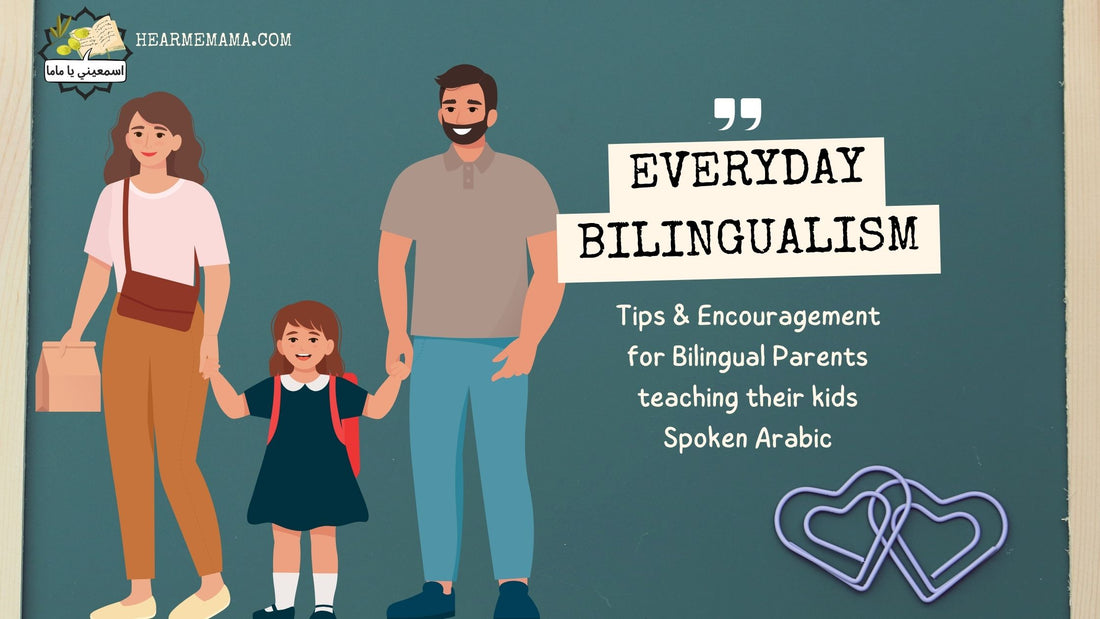
Everyday Bilingualism: Tips & Encouragement for Bilingual Parents
Every day with your child is filled with little moments—some big, some small—but each one an opportunity to share the gift of language and culture. For those of us raising kids to speak Arabic and stay connected to their heritage, every simple interaction becomes an invaluable teaching tool.
Here, we’ll share how ordinary parenting moments become precious bilingual language lessons in spoken Arabic (Levantine dialect).
Whether it’s at the playground, during bedtime routines, or just walking in the yard, every word, every phrase becomes a gentle way to teach language and connect deeply with our children. It doesn't have to be complicated: these tips about Arabic for kids show just how easy and powerful these everyday moments can be.
1. Embrace Everyday Actions as Language Lessons:
Language learning doesn’t only happen with books or flashcards; it unfolds naturally, moment by moment. Whether it’s going “up and down” (فوق وتحت) on the playground slide, or opening and closing (افتح وسكر) the bedroom door, each action is a chance to reinforce spoken Arabic in a way that feels genuine and joyful.
That's why it's important to narrate your child's day as they go about their activities.
In these tiny exchanges, we can see our children light up with understanding. When we say “push and pull” (دفع وسحب) the suitcase at the airport, or “come here” (امشي، تعال هون) when playing in the yard, they are learning to connect those words what their body is doing.
2. Speak in Levantine Dialect with Love and Warmth:
With every phrase spoken in Levantine dialect, we’re giving our children a piece of their cultural heritage. Simple, heartfelt moments like “I love you” (بحبك) mean so much in any language, but sharing them in Arabic helps build their connection to family and identity. Seeing your little ones hug and say “بحبك” is a reminder that these shared words are also shared bonds, and hearing these phrases regularly helps them feel at home with the language & build a positive relationship with language learning.
3. Make Reading Time an Adventure:
Daily reading with bilingual Arabic books turns quiet moments into learning moments. Taking a book along in the car, snuggling up before bed, or just enjoying a story together brings Arabic into your day in a way that is focused and intentional. If you can, choose books in spoken Arabic / Levantine dialect that have familiar phrases, objects, and activities, to help your kids see themselves in the stories and connect with the language they’re learning.
4. Remember: Every Word, Every Moment Counts
As parents, it’s easy to overlook how much we’re already teaching through our everyday actions. But each word we share, each song we sing, each story we read, is helping our children learn and thrive. The everyday joy of watching them explore their world—through games, play, or those sweet “I love you” moments—shows that bilingual parenting is less about formal lessons and more about filling their lives with love and language.
Looking for More Resources?
If you’re inspired to add more language-learning tools to your parenting journey, check out our Arabic baby books in spoken Arabic / Levantine dialect. Our books are designed to help kids learn Arabic naturally while connecting with their cultural roots—perfect for parents looking for easy, joyful ways to teach Arabic at home.
Every moment with your child can be a language lesson, a memory, and a chance to share your heritage. Happy parenting!
